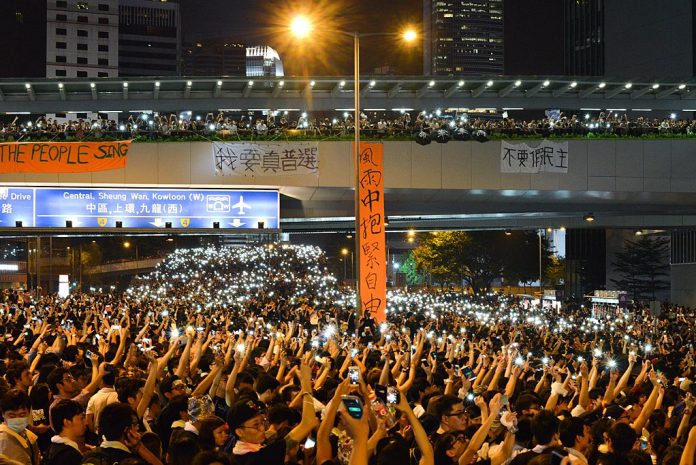Last month, Hong Kong Public Opinion Research Institute’s poll results showed the world that Hong Kong’s protestors are unwavering in their fight for independence and democracy. However, equally determined is China to quell even the slightest dissent towards its political presence in Hong Kong. If this month’s unprecedented crackdown on pro-democracy protesters is any indication, China prizes Hong Kong and would certainly travel great lengths to preserve the very bedrock of its relationship: the one country, two systems framework. While following the trajectory of Hong Kong-China relations, it becomes clear that Hong Kong means much more than a financial hub to China. With time, it has acquired a renewed importance, making it critical to China’s grand ambitions. However, to enhance Hong Kong’s contribution to China’s plans, it must maintain the one country, two systems framework in its present form.
Among its many new roles, a commonly unnoticed one is Hong Kong’s part in positioning China at the forefront of innovative technology. Thanks to well-trained Hong Kong graduates who are flooding China’s start-up space, China has made impressive strides in technology. To its credit, China is the brain behind many of the world’s firsts in technology and innovation including automated trackless trains, waste-to-energy plants and robotic doctor. Interestingly, many of China’s leading technology firms such as SenseTime, Orbbecc and DJI, specialising in AI and Robotics find their roots in Hong Kong’s premiere institutes. What the founders of such leading tech companies have in common is that they all graduated from Hong Kong’s universities and set up their businesses in China. Their experiences in undertaking advanced research make up for the absence of such skills in the Chinese tech industry.
China’s own efforts to spur tech entrepreneurs is partly responsible for the upsurge in young tech talent from Hong Kong. While the protests peaked in Hong Kong, China’s tech companies opened up new internship opportunities in prominent innovation hubs such as Shenzhen and Guangzhou. Further, in its plans for the Greater Bay Area, China proposed creating an economic cluster by linking parts of Hong Kong, Macau and urban regions in Southern China. These plans largely hinge upon trained tech students from Hong Kong.
Historically, the absence of export controls in Hong Kong helped China obtain Western technology. Until today, Hong Kong continues to serve this purpose. Last year, U.S. officials expressed their concerns about Hong Kong being used as a channel by China to steal sensitive and advanced Western technologies. It is not just China’s unique relationship with Hong Kong that it has exploited but also Hong Kong’s special economic relations with the United States.
China has a more long-term concern regarding its relations with Hong Kong. The Chinese government fears that any collective anti-government stance in Hong Kong will jeopardize China’s grand ambitions at home and abroad. Maintaining Hong Kong’s current political system is crucial to the Chinese Communist Party as anti-government forces can send the one-party power structure tumbling down. The profiles of those who were arrested by China this month reveal these concerns. One of them, Jimmy Lai, is the founder of the anti-establishment newspaper, Apply Daily. Apart from leading a publication that has continuously condemned China’s actions in Hong Kong, Lai also provided financial support to the pro-democracy protests. Other notable figures include former legislators such as Martin Lee, Albert Ho, Leung Kwok-hung and Au Nok-hin. Martin Lee, commonly referred to as the father of Hong Kong’s democracy laid the foundations for the pro-democracy movement.
By arresting outspoken and high-profile pro-democracy figures, China is attempting to stem the flow of “Western ideas”. Claiming stability and relevance of the one country, two systems is a part of its strategy to prevent protests in Hong Kong from directing mainland residents’ attention towards controversial subjects and enabling them to question government actions. As a majority of them were legislators, the clampdown was also viewed by some as an effort to weaken the opposition in the forthcoming legislative elections.
As an international maritime trading hub with a proximity to Southeast Asian markets, Hong Kong facilitates huge trade between China and the United States, and Asia. Nearly 80 percent of Hong Kong’s transhipment business is related to Chinese cargo. However, with the quick rise of mainland ports such as Ghuangzhou and Shenzhen, the port of Hong Kong not only declined in ranks but also in relevance to the mainland. But with the Belt and Road Initiative expanding to different parts of the world, Hong Kong has acquired a new and important role.
A robust shipping industry coupled with Hong Kong’s free economy and its status as a global financial centre makes it an indispensable link in China’s BRI. It provides sea-cargo related services to 58 countries located in the BRI corridors and thereby helps in deepening trade relations between China and the rest of the world. For China, Hong Kong’s reputation as a world-class provider of financial services such as investment, financial accounting and risk management can dispel doubts regarding the credibility of the BRI projects. If Hong Kong’s financial institutions work with China’s to finance the infrastructure projects, it can serve as its chief financing vehicle while helping to attract technology and lend the BRI a global character. Moreover, China sees the potential of Hong Kong’s legal professionals in providing assistance in international laws pertaining to the projects.
Hong Kong’s unique system is also key to China’s plans for Taiwan. By maintaining a political presence in Hong Kong through the one country, two systems model, China hopes to gain greater control over Taiwan and perhaps extend a similar arrangement that will unify it with the island nation. Although Taiwan’s President Tsai Ing-wen clearly ruled out such an arrangement, China’s history of using economic tactics and military expansion gives it an upper hand. Moreover, many countries cut their ties with Taiwan with the expectation of having closer ties with China, leaving the island nation with merely 15 allies. By striving to save its special relationship with Hong Kong, China is attempting to focus Taiwan’s attention on the semi-autonomous system in Hong Kong which grants certain freedoms to Hong Kongers that are not otherwise enjoyed by residents of the mainland.
The recent arrests of pro-democracy protesters reveal that China is relentless when it comes to safe-guarding its relationship with Hong Kong. But equally important is the continuity of the one country, two systems formula that will help China in retaining its control over the island while making the best use of Hong Kong’s unique features to accomplish its own goals at home and abroad. China certainly needs Hong Kong, but for different reasons.
The views and opinions expressed in this article are those of the author.



